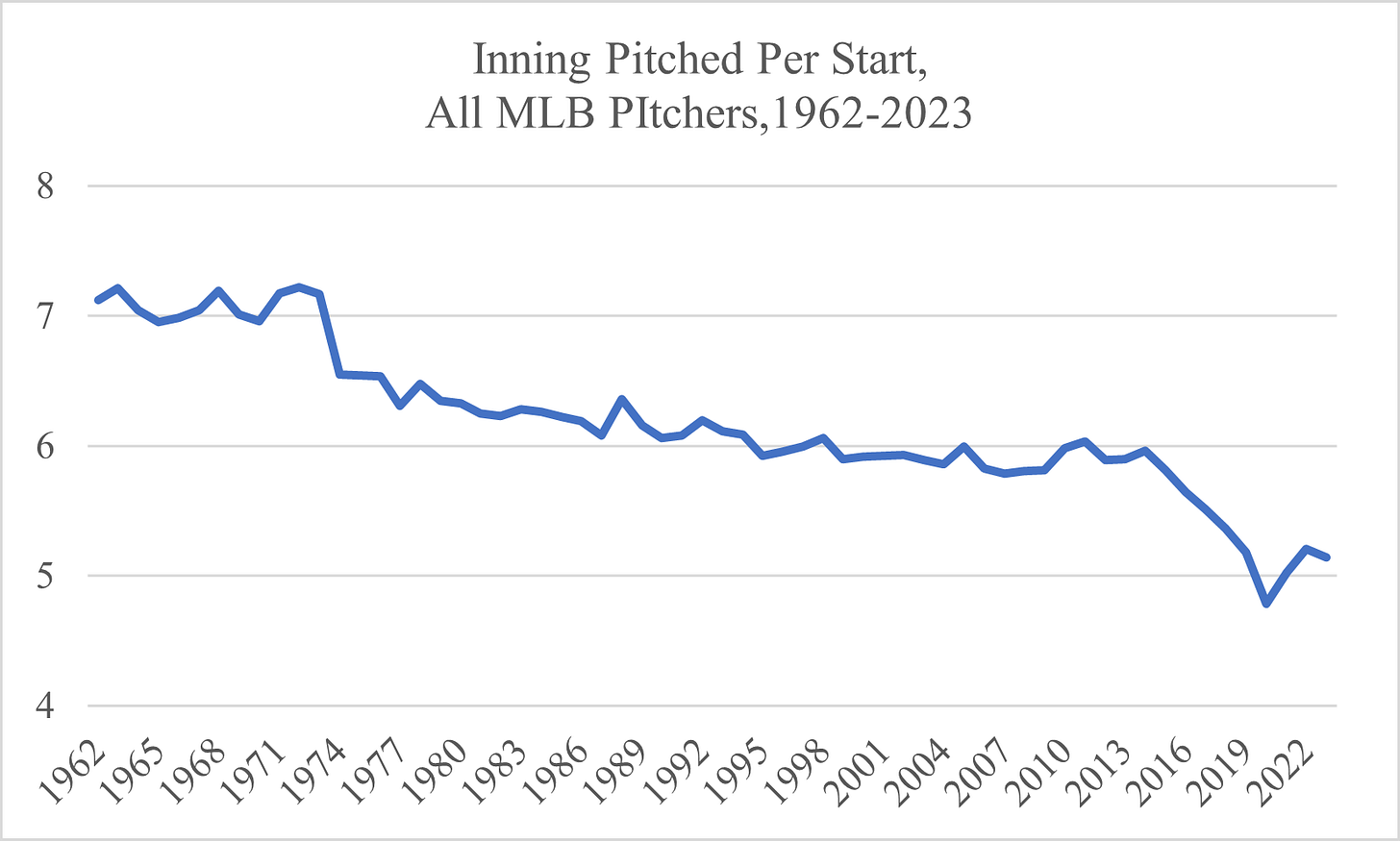Positive Reaction to Hader Signing Shows Shifts in Analytical Thinking
I expected analytics types to criticize the Hader signing, but they have been neutral. Why so? Bullpens are more important in today's game and spending at the top of the market.
When I wrote about the Astros signing Josh Hader, I began by contrasting my relatively positive view against the idea that “[a]s an analytics guy, I’m supposed to hate a signing like Hader.”
The consensus in analytic thinking was that bullpens are not a good place to sink a team’s scare resources since relievers are volatile and good ones just “emerge” seemingly out of nowhere.
To demonstrate that, I cited two highly respected voices in baseball analysis—Joe Sheehan, who described the Hader signing as a “weird choice”; and Keith Law, who wrote on Twitter that “the history of free-agent relievers who sign 4+ year deals is dismal.”
Yet, as I read more about the Hader signing from analytic types, I found few agreed with Sheehan and Law. While many acknowledged that there are, as I wrote “serious downside risks” to a long-term deal with a pitcher who throws 60 innings, there were clear benefits to the deal for the Astros.
In short, thinking in the analytics community about signing relievers and big free agents has changed over time. I explore why here, and highlight two explanations. The first is that the value of relievers has increased as the number of innings thrown by relievers has increased. And the second is that the resources of owners are not as scarce as presumed earlier.
Analytic Reaction to the Hader Signing
At Fangraphs, Ben Clemens saw the deal as way for the Astros to address the team’s “disappointment” with the end of the 2023 season by addressing “a thin bullpen by signing a pitcher with a “mind-bending fastball” and an “equally devastating slider” to create “a fearsome three-headed monster to end games” by signing a “dominant closer” to a “market rate contract.”
It was not a “weird choice,” according to Clemens, Instead, there was “nothing particularly wild or exciting about this deal.”
At Baseball Prospectus, Ginny Searle wrote that signing Hader “seems an admission that this team simply can’t keep the machine running forever without a change in tactics, and that the next few years might be the best chance for a while to lock in one more title.”
That’s very similar to my conclusion that the fact that the Astros face a “must win” season in 2024, “it’s a deal that works.”
Both Clemens and Searle acknowledge the downsides of signing Hader--the deal is expensive and Hader is prone to issuing too many walks thanks to shaky fastball command. But they also conclude that the upside is worth it.
A team with playoff aspirations can use a high-quality reliever, and why not get the best.
That view also comes through even more strongly in a write-up from Joe Sheehan. Yes, the same Joe Sheehan who I cited earlier describing the Hader signing as a “weird choice.”
Upon further reflection, Sheehan saw more of the positives of signing Hader.
My initial reaction was to wince. Relievers are fungible talents, and paying retail for one is just never going to make my socks roll up and down.
Look closely at Hader, though, and you see that he meets some of the tenets I’ve been writing about this offseason. Two years ago he had his worst season, which still came to a 3.45 FIP and a 37% strikeout rate. In seven seasons, six full, Hader has been worth two wins five times. Most relievers burn fast and hot, but Hader may well be the best of his era, in line for the kind of longevity we saw from Billy Wagner and Joe Nathan in a previous generation. If “sign the best players in free agency” is a core principle, signing Josh Hader at least fits the mold of signing the very best reliever out there.
Why Analytic Types Have Changed Our Minds
Reading through these analyses, Law’s conclusion that Hader’s decline over the outyears of the contract make it a bad bet are not present. And no one believes it is a “weird choice,” even Sheehan after reflection.
So why has the consensus among analytic types about signing relievers to big contracts changed over time? I cite two reasons.
The first is the continued and growing importance of bullpens. The chart below shows the average number of innings per start in the majors since 1962.
The share of innings taken by starters was relatively stable from the late 1980s until the mid-2010s. That number has fallen rapidly over the last decade, from 6.0 innings in 2014 to 5.1 last season.
The rest of the innings are taken up by bullpen arms. It makes more sense for the Astros (and any team) to put more resources into their bullpen because that bullpen will cover more innings.
The Astros have been immune from this trend (their starters have thrown the most or second most innings in the majors in 2021, 2022, & 2023). But the change in manager from a traditionalist in Dusty Baker to a more analytics-forward type in Jose Espada may signal a change in starter usage.
The other shift in analytic thinking has to do with how teams think about their scarce resources. Analytic thinking reached the mainstream at the turn of the Century and it often focused on how teams could wring more efficiency out of lower payrolls.
Over the last two decades, it is clear that payroll disparities are not as big today. Teams spend more, both in absolute dollars and as a share of the luxury tax.
And if you’re going to spend money, why half ass it. You can that in the quote from Sheehan, where he describes “sign the best players in free agency” as a “core principle.”
His article on the Hader signing also included his analysis of other recent signings of other relievers (Robert Stephenson, Matt Moore, Aroldis Chapman, & Hector Neris).
Sheehan writes “Sign Josh Hader, and at least you’re pretty well assured of getting one of the best relievers in baseball. The reliever pyramid, though, flattens out in a hurry, and you end up signing 20% of Hader for 50% of the AAV. I don’t like any of these deals.”
It seems likely a similar thought process went through the Astros front office after Kendall Graveman had season ending shoulder surgery. “We need to bear down and sign a reliever, and if we’re going to sign a reliever and pay the luxury tax, why half ass it? Sign the best player.
The Astros front office seemed to change its perspective and it led them to the conclusion that a deal for Josh Hader was worth its downsides. Similarly, the baseball analytics community has seemed to have changed its perspective and it led them to conclude that the deal for Josh Hader was worth its downsides.
Change is good.





